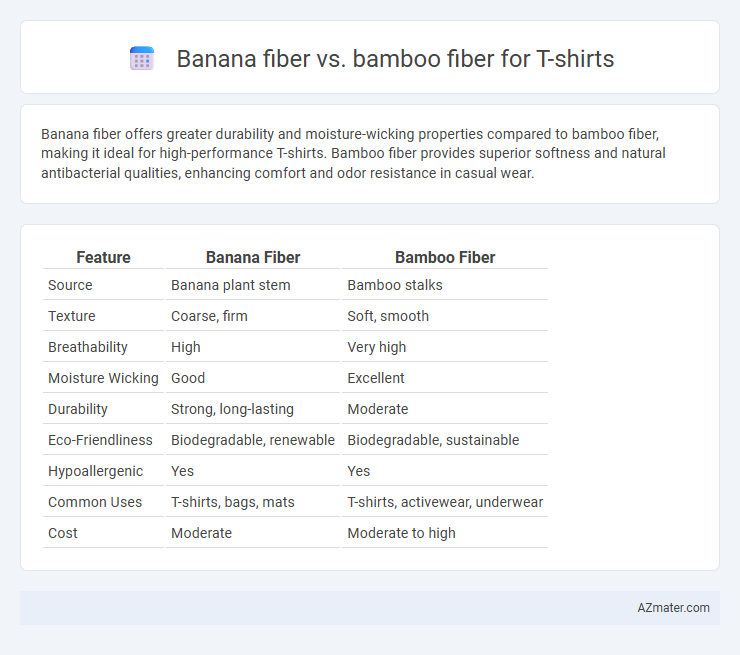Banana fiber offers greater durability and moisture-wicking properties compared to bamboo fiber, making it ideal for high-performance T-shirts. Bamboo fiber provides superior softness and natural antibacterial qualities, enhancing comfort and odor resistance in casual wear.
Table of Comparison
| Feature | Banana Fiber | Bamboo Fiber |
|---|---|---|
| Source | Banana plant stem | Bamboo stalks |
| Texture | Coarse, firm | Soft, smooth |
| Breathability | High | Very high |
| Moisture Wicking | Good | Excellent |
| Durability | Strong, long-lasting | Moderate |
| Eco-Friendliness | Biodegradable, renewable | Biodegradable, sustainable |
| Hypoallergenic | Yes | Yes |
| Common Uses | T-shirts, bags, mats | T-shirts, activewear, underwear |
| Cost | Moderate | Moderate to high |
Introduction: The Rise of Sustainable Fibers
Banana fiber and bamboo fiber are emerging as sustainable alternatives in the textile industry, especially for T-shirt production due to their eco-friendly properties. Banana fiber is derived from the pseudostem of banana plants, offering strong, biodegradable material with natural antibacterial qualities. Bamboo fiber, extracted from bamboo pulp, is celebrated for its softness, moisture-wicking capabilities, and rapid renewability, making both fibers popular choices in sustainable fashion.
What is Banana Fiber?
Banana fiber is a natural textile made from the inner bark of banana plants, known for its strength, biodegradability, and smooth texture, making it an eco-friendly alternative to traditional fibers in T-shirt production. Compared to bamboo fiber, banana fiber offers higher durability and moisture-wicking properties, contributing to long-lasting, breathable garments. Its renewable sourcing from agricultural waste supports sustainable fashion initiatives by reducing environmental impact.
What is Bamboo Fiber?
Bamboo fiber is a natural textile made from the pulp of bamboo grass, known for its softness, breathability, and moisture-wicking properties, making it ideal for T-shirts. It is eco-friendly, biodegradable, and has antibacterial qualities that help reduce odor, enhancing comfort during wear. Compared to other natural fibers like banana fiber, bamboo fiber offers a smoother texture and greater durability in clothing applications.
Environmental Impact: Banana vs Bamboo
Banana fiber production generates significantly lower water consumption and releases fewer greenhouse gases compared to bamboo fiber, making it a more environmentally sustainable choice for T-shirts. Bamboo cultivation generally requires more land and chemical processing, which can lead to habitat disruption and pollution. Choosing banana fiber helps reduce deforestation risks and promotes eco-friendly agricultural practices due to its use of banana plant waste.
Production Process Comparison
Banana fiber production for T-shirts involves extracting fibers from banana tree pseudostems through degumming and retting processes, which are labor-intensive but yield strong, biodegradable fibers with minimal chemical use. Bamboo fiber production typically uses either mechanical crushing or chemical soaking methods; mechanical processes preserve natural fiber strength and sustainability, while chemical processes, such as viscose production, involve harsh chemicals that impact environmental safety. Comparing both, banana fiber offers a more eco-friendly and sustainable mechanical extraction with less chemical intervention, whereas bamboo fiber's production varies significantly in environmental impact depending on the chosen processing technique.
Softness and Comfort: Which Feels Better?
Banana fiber offers a naturally coarse texture that softens with washing, providing moderate comfort suitable for casual wear. Bamboo fiber is renowned for its exceptional softness and moisture-wicking properties, making it more breathable and comfortable against the skin for extended periods. Consumers seeking a smooth, soft, and highly comfortable T-shirt typically prefer bamboo fiber due to its silk-like feel and superior softness.
Breathability and Moisture-Wicking Properties
Banana fiber offers excellent breathability due to its natural porous structure, making it ideal for T-shirts in hot and humid climates. Bamboo fiber excels in moisture-wicking properties, quickly drawing sweat away from the skin to keep the wearer dry and comfortable during intense physical activities. Both fibers provide eco-friendly alternatives, but bamboo's superior moisture management makes it a preferred choice for activewear.
Durability and Longevity
Banana fiber offers exceptional durability in T-shirts due to its strong lignin content, providing resistance to wear and tear over time. Bamboo fiber, while softer and more breathable, tends to have slightly less tensile strength but benefits from natural antibacterial properties that extend garment longevity by reducing odor and bacterial damage. Both fibers contribute to sustainable fashion, with banana fiber excelling in structural resilience and bamboo fiber offering enhanced comfort and maintenance benefits.
Style and Aesthetics in T-Shirts
Banana fiber T-shirts showcase a natural, rustic texture with a unique sheen, offering a distinctive, eco-friendly aesthetic that appeals to sustainable fashion enthusiasts. Bamboo fiber T-shirts provide a smooth, silky finish with excellent drape, giving a modern and polished look suitable for casual and formal wear. Both fibers contribute to stylish, breathable garments, but banana fiber stands out for its artisanal appearance, while bamboo fiber excels in delivering sleek, refined aesthetics.
Price and Market Availability
Banana fiber T-shirts generally come with a higher price point due to limited production and niche market demand, whereas bamboo fiber T-shirts are more competitively priced thanks to mass production and widespread availability. Bamboo fiber benefits from a well-established supply chain, making it readily accessible in global markets compared to the relatively scarce banana fiber. Price sensitivity and market presence make bamboo fiber a preferred choice for budget-conscious consumers and large-scale retailers.

Infographic: Banana fiber vs Bamboo fiber for T-shirt
 azmater.com
azmater.com